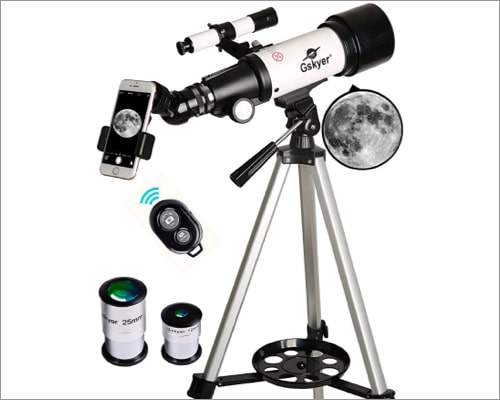However, with the right apps and equipment, you can try your hand at it and grab some pretty cool shots of the night sky. They might be a far cry from what’s possible with a professional camera, but they’re still worth admiring.
Which are the best iPhones for astrophotography?
If you’re wondering what’s the best iPhone for astrophotography, obviously, the newer, the better. The iPhone 14, 14, 12 and 11 series boast advanced cameras that give you more control over the settings to achieve better images. Moreover, the Night Mode camera in these devices makes it easy to capture the sky. However, you can also try your hand with an iPhone X and earlier, though the results might not be as good due to the lack of the night mode feature.
What do you need for iPhone astrophotography?
There are a few different ways to shoot the night sky with an iPhone, and you’ll need some different equipment for each method, as listed below.
Method 1 – iPhone + tripod + Bluetooth remote Method 2 – iPhone + telescope Method 3 – iPhone + binoculars or monocular
Note: You can use specialized iPhone astrophotography apps in all the methods to further enhance your clicks.
Method 1 – Astrophotography using your iPhone and a tripod
This is a straightforward and inexpensive method, but it doesn’t yield the best results. However, it’s perfect for beginners. All you need is a mobile tripod and a Bluetooth remote to trigger the camera shutter. This is because when you manually trigger the shutter on your camera by touching your phone, it shakes the device and reduces the quality of the image. To ensure your phone stays absolutely steady, you need to put it on a tripod and use a remote to trigger the camera. Try this product: UBeesize TR50 Tripod with Bluetooth Remote UBeesize’s TR50 tripod is stable, compact, lightweight, and ideal for long exposure or time-lapse photography. The bonus Bluetooth button is an added advantage of buying this tripod. Features:
3-way pan head with level bubble Adjustable height (flip-lock included) Faux leather built 360° panorama shooting Super light in weight (2.2 pounds)
How to shoot: As mentioned above, this is a pretty rudimentary method of astrophotography with iPhone, but the tripod makes a world of difference to keep your camera steady and focussed.
Method 2 – Astrophotography using your iPhone and telescope
If you want to step it up a notch and get more detailed photographs of the moon and other celestial objects, buying a telescope for iPhone can be a worthy investment. In addition to letting you observe the sky, they come with phone mounts that can help you capture images of what you see. Try this product: Gskyer telescope Explore the skies while protecting your eyes with this Gskyer’s iPhone telescope. It’s easy to use, making it ideal for both adults and kids. Although a bit expensive, the telescope comes with a 2-year warranty and features a wireless remote. So worth your investment! Specifications:
Aperture: 70mm Focal length: 400mm (f/5.7) Zenith mirrors: 48°Erecting BAK4 prism
How to shoot: A telescope is a bit of an investment, but if you’re passionate about stargazing, it can be a worthy purchase. Plus, it will yield much better night sky photos than your iPhone camera on its own. How to shoot:
Method 3 – Astrophotography using iPhone and binoculars or monocular
Yet another option for iPhone astrophotography is using a pair of binoculars or a monocular. These work in the same way as a telescope but won’t give you as many details of celestial objects. Moreover, it’s challenging to hold them steady when taking your shots. However, they are easier to carry around, hence, more convenient. Try this product: Gosky Binoculars View far-off objects with ease thanks to the 10X power magnification and large field of view of these binoculars, specially designed for outdoor activities. Specifications:
Material: FMC Lens+Durable Body+Rubber Ammor Prism: Porro Focus type: Center focus Field of view: 307ft/1000yds
How to shoot: Ready to reach for the stars with these iPhone astrophotography ways? I believe that even the best photos of the night sky cannot do justice to its beauty, but I hope this guide for iPhone astrophotography has helped you take some fantastic shots of the moon and stars. Which method did you go for, and what did you shoot? Let me know in the comments below. You can also further enhance your images with the best photo editing apps. Read next:
Best photography apps for iPhone Best astrophotography apps for iPhone How to use Photographic Styles on iPhone 13


